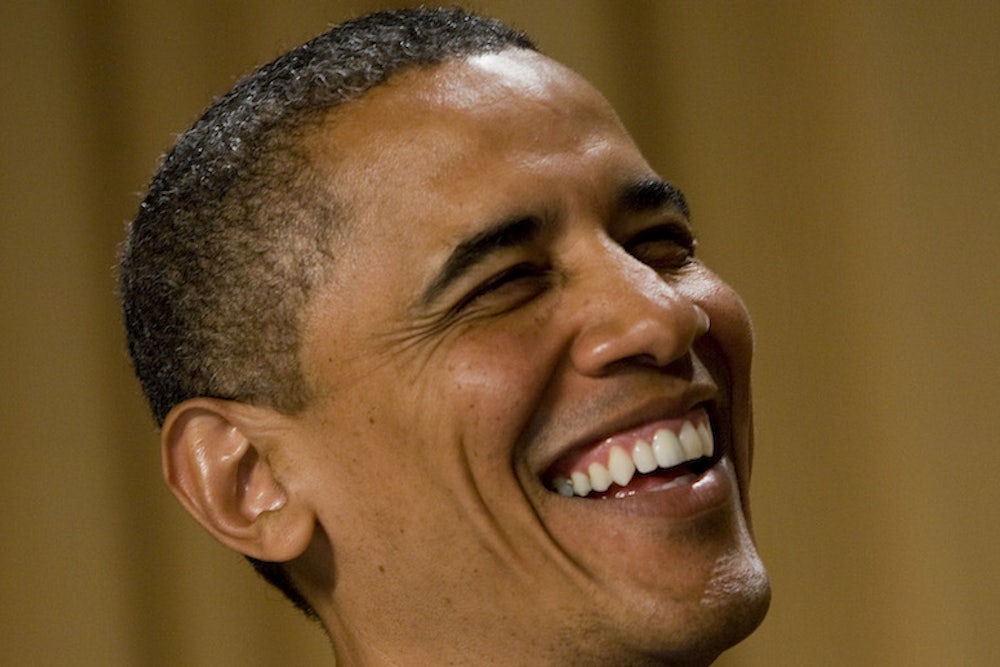Here’s a sign that the politics of Obamacare are changing: The president is using the law to troll his political adversaries.
Last week, when Obama announced that signups for open enrollment had exceeded 8 million, he declared, “the repeal debate is and should be over. The ACA is working and I know the same people don’t want us spending the next two-and-a-half years fighting the settled political debates of the last five years.” Republicans and their allies were apoplectic. Sean Spicer, spokesman for the Republican National Committee, promised that Obamacare “is still the number one, number two and number three issue going into this election.” It's the same way they reacted the last time Obama said something similar—in early April, when signups climbed past 7 million. “No way, Mr. President,” Bill Kristol responded in the Weekly Standard. “We do not accept, we do not acquiesce in, this deplorable piece of legislation. The debate is not over.”
In one sense, Obama is quite obviously correct. Repealing the Affordable Care Act is no longer a viable political option. Too many people already count on it for insurance. Too many people now expect that insurers will sell them coverage, no matter what their pre-existing conditions, and rely on federal subsidies to offset the cost. Even House Speaker John Boehner just admitted the cause was futile—although it remains to be seen whether he’ll walk away from those remarks, as he quickly did after making similar statements following the 2012 presidential election.
But there is also a sense in which Obama is wrong and the conservatives are right. For all of the hyperbole about plan cancellations and rate shock, there are plenty of people who really are paying higher premiums — or had to relinquish coverage they liked. Some new problems with the law will come up, even as the old ones fade away. This is the single most important piece of legislation in a generation—and the fundamental questions, about priorities and the proper role of government, are timeless. Of course the debate will continue. It should.
Obama probably agrees, actually. He talks all the time about working with Republicans to modify the law in mutually agreeable ways—something that, in a less polarized political environment, would be totally normal. But he also knows Republicans have no interest in that kind of conversation—and that, politically, his posture makes a lot of sense.
Consider the state of public opinion. New polling from The Upshot and Kaiser Family Foundation is consistent with findings from previous surveys: Obamacare is not popular, even if its features are. But the Upshot/Kaiser poll also showed clearly that majorities of respondents oppose repealing the law outright, even in deeply conservative pockets of the South. That, too, is a familiar result. Meanwhile, previous surveys have suggested a majority of Americans simply want to move on to other issues. In the March Kaiser tracking poll, which is different from the survey Kaiser ran with Upshot, 53 percent agreed with the statement, “I’m tired of hearing about the debate over the health care law and I think the country should focus on other issues.” Just 42 percent said it was important to continue debating about the law.

Political strategy isn't my speciality. I'm a policy guy. But in this environment, it seems to me, the most sensible approach for Obama and Democrats is to defend the Affordable Care Act aggressively—as they are increasingly doing—while trying to promote other causes, like a higher minimum wage and immigration reform, where Democratic positions are more popular. The more Republicans insist that the big debate over Obamacare is not over, the more they look like obstructionists whose agenda consists largely of trying to undo what Obama has done.
That perception would line up neatly with reality. And it'd probably help Democrats in November—enough that, just maybe, Obama is baiting Republicans into it.
